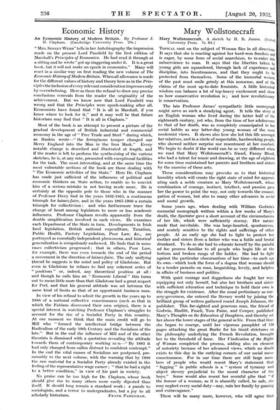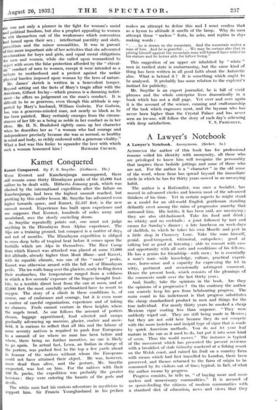Mary Wollstonecraft
TOPICAL cant on the subject of Woman flies in all directions. It says that she is reacting against her hard-won freedom and is eager, by some form of social anarchism, to re-enter into subservience to man. It says that the liberties taken by young girls are squandered, through lack of experience and discipline, into licentiousness, and that they ought to be protected from themselves. Some of the immortal women of the past must smile grimly at this nonsense, and at the claims of the most up-to-date feminists. A little historical wisdom can balance a lot of top-heavy excitement and show us how conservative revolution is ; and how revolutionary is conservatism.
The late Professor James' sympathetic little monograph might serve as such a steadying agent. It tells the story of an English woman who lived during the latter half of the eighteenth century, yet who, from the time of her adolescence to that of her death, was as completely emancipated in her social habits as any latter-day young woman of the most modernist views. It shows also how she led this life amongst her relatives, and in a circle of respectable, hardworking people, who showed neither surprise nor resentment at her conduct. We begin to doubt if the world can be so very different when we read that Mary Wollstonecraft's friend, Fanny Blood, who had a talent for music and drawing, at the age of eighteen for some time maintained her parents and brothers and sisters by the exercise of these arts.
These considerations may provoke us to that historical humility which will create the right state of mind for appreci- ating such a noble creature as Mary Wollstonecraft, whose combination of courage, instinct, intellect, and passion gave her the power to point the way, not only towards the emanci- pation of women, but also to many other advances in social and moral growth.
Some years ago, when dealing with William Godwies memorial monograph written within a few weeks of Mary's death, the Spectator gave a short account of the circumstances of her life, which were sufficiently stormy. Her nature made that inevitable. She was large-hearted, spontaneous, and acutely sensitive to the rights and sufferings of other people. At an early age she had to fight to protect her mother and sisters from a father who was a futile and brutal drunkard. To do so she had to educate herself by the painful ad hoc process familiar to all people who begin life at the bottom and broken rungs of the ladder. She had to fight against the particular obscurantism of her time—to each age its own—which took the form of a dogma that woman should be a tender parasite on man, languishing, lovely, and helpless in affairs of business and politics.
With quiet courage and doggedness she fought her way, equipping not only herself, but also her brothers and sisters with sufficient education and technique to hold their own in the struggle for existence. After the usual preliminary as nur- sery-governess, she entered the literary world by joining the brilliant group of writers gathered round Joseph Johnson, the publisher. This far-sighted and generous man, the friend of Godwin, Hazlitt, Fuseli, Tom Paine, and Cowper, published Mary's Thoughts on the Education of Daughters, and thereby set her above the lower stages of the general mBee. From that time she began to emerge, until her vigorous pamphlet of 150 pages attacking the great Burke for his timid strictures on the philosophy underlying the French Revolution, brought her to the threshold of fame. Her Vindication of the Rights of Woman completed the process, adding also an element of notoriety because of her advanced views, which no doubt exists to this day in the outlying corners of our social mass- consciousness. For in our time there are still large num- bers of people who would resent Mary's statement that " fagging " in public schools is a " system of tyranny and abject slavery prejudicial to the moral character of the boys." Some would also resent her scornful gibe that " if the honour of a woman, as it is absurdly called, be safe, she may neglect every social duty—nay, ruin her family by gaming and extravagance."
There will be many more, however, who will agree that
e was not only a pioneer in the fight for woman's social d political freedom, but also a prophet appealing to women stir themselves out of the weaknesses which convention forced upon their sex ; intellectual puerility and sloth, parasitism and the minor sensualities. It was in pursuit of this more important side of her activities that she advocated ea-education for boys and girls, and equal moral obligations for men and women, while she called upon womankind to reject with scorn the false protection afforded by the " chival- ric " conduct of men to women, except it were intended as a tribute to motherhood and a protest against the unfair physical burden imposed upon woman by the laws of nature. Mr. James' sketch is written in a benevolent temper. Beyond setting out the facts of Mary's tragic affair with the American, Gilbert Im lay—which process is a damning indict- ment—he offers no judgement on the man's conduct. It is difficult to be so generous, even though this attitude is sup- ported by Mary's husband, William Godwin. For Godwin, too, was a generous-minded man, not nearly so black as he has been painted. Mary certainly emerges from the circum- stances of her life as a being as noble in her conduct as in her ideas. Mr. H. N. Brailsford rightly sums up her character when he describes her as " a woman who had courage and independence precisely because she was so normal, so healthy in mind and body, so richly endowed with a generous vitality." What a fool was this Imlay to squander the love with which































 Previous page
Previous page